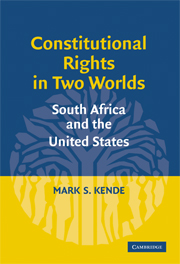4 - Gender Equality
Published online by Cambridge University Press: 25 July 2009
Summary
At first glance, the distinction between substantive equality and formal equality looks obvious. Substantive equality requires that the courts favor the historically disadvantaged class. In contrast, formal equality presumes that courts should treat everyone the same. Yet, these distinctions are not always so clear, especially in gender discrimination cases. Do laws that advantage women actually promote equality or demonstrate that women remain second-class citizens who need assistance? Should laws that have a disparate impact on women automatically be illegal even if there is no discriminatory animus?
This chapter addresses these questions by focusing on two important Constitutional Court decisions and their American analogues. The South African cases show that the temptation to treat all people the same, regardless of historical circumstances, remains strong even under South Africa's transformative charter.
The first case involves Nelson Mandela's pardon of women in prison, along with children under age 12, who committed nonviolent offenses. The second case involves the criminalization of prostitution. There is an interesting connection between the two cases as some women may have been imprisoned because of prostitution or other vice-related activities. In addition, both cases touch on the sexual roles that women play — biological mother in one, “temptress” in another. Moreover, the Court in both cases ruled for the government. Yet, the Court applied substantive equality correctly in the first case, but not in the second. This chapter explains how that happened and also addresses privacy issues from the prostitution case.
- Type
- Chapter
- Information
- Constitutional Rights in Two WorldsSouth Africa and the United States, pp. 91 - 132Publisher: Cambridge University PressPrint publication year: 2009



